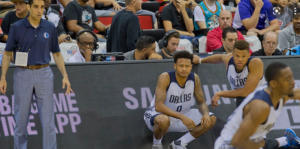It’s that time of year. Playing rotations are either decided or soon to be so. All across the U.S.A. (the world for that matter), coaches are being second-guessed by the players who didn’t make them (or did, but in their minds, inadequately). Not only are the players peeved, but also so are their parents, relatives, friends and associates.
With that backdrop, let’s share some thoughts about playing rotations.
Generally, on most teams, at least half of the players (or their supporters) aren’t happy with their minutes. This isn’t a new phenomenon; it’s just that players and their support groups are more vocal about perceived injustices than they were prior to the internet, summer travel basketball, the NBA salary explosion, recruiting exposure, and the various means of media hype out there today.
Before we get into any kind of depth about how a player reacts to his situation, I would suggest that coaches read the previous Hoop Coach article, “Does Your Playing Rotation Bury Players?” The gist of that article is that we sometimes unwittingly choose a rotation and then give the non-rotation players little or chance of cracking it. Of course, there are coaches who choose their rotations and then give no thought to any ramifications. I’m not here to argue with that position.
Assuming that one has an open mind about a playing rotation for one’s team, in this article, let’s discuss some thoughts for players to consider:
How to get more playing time
- If you’re in a program where winning is important, playing time is not a right; it must be earned. Generally, the higher the level of play, the more often winning is the primary goal. However, even at lower levels, winning is more important in certain leagues and on certain teams than in others. Know your program’s expectations. Don’t be surprised if playing time is totally based on merit. If you are, that’s your fault.
- If you didn’t make your rotation at all or aren’t happy with your spot in the rotation, don’t compound it further “burying yourself” by pouting, sulking, complaining, whining and bad body language. For sure, these actions won’t help.
- Fight for what you want. Don’t expect anything to be handed to you. The process is about competition. You didn’t get into your situation in a day, so you won’t get out of it in a day.
- There are many ways to advance but they all include being positive and focused.
- Your games, for the time being, are your practices. Don’t waste a minute of practice time not trying to get better. It’s almost ridiculous to say but that is what practice is for. I’ve seen players bail out on practice after the first game of the season and waste an entire year with negative dissatisfaction.
- It is OK to be not be satisfied with your role but it should be channeled in the right direction.
- Talking with the head coach or an assistant about your situation is recommended but after you receive a few clues about your situation, you want to put your actions to work. You need a direction but constant talking about your situation is a waste of time. If defense (or any other phase) is the issue, then attack it with everything you have.
- Tune out the clutter. If you’re listening to others complain for you, that won’t help. There is probably pressure for you to listen to some, more than others. But, in the end you have to solve the problem yourself. There are actions which will help you and other actions that won’t. It’s about you figuring it out.
- Realistically, you may not be able to figure things out and resolve matters to your satisfaction but the end of the season is when that thought process begins.



